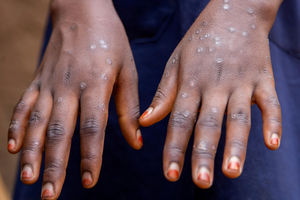Kenya still waiting for Mpox vaccines despite reporting first death

Kenya is yet to receive its first batch of Mpox vaccines despite reporting its first Mpox death last week.
What you need to know:
- There is one reported death and 14 Mpox cases distributed in several counties.
Kenya is yet to receive its first batch of Mpox vaccines despite reporting its first Mpox death on Monday.
This means that while the country continues to record high transit activities to and from various high-risk countries, there could be possible loopholes that could lead to an upsurge of cases along the border entries.
While the Ministry of Health says it will continue to tighten the measures across the borders, the narrative is quite the contrary at the Nairobi - Namanga border entry as there is no active testing or screening of the virus.
Kenya has since reported one death and 14 Mpox cases distributed in several counties including Nakuru (2), Kajiado (2), Bungoma (2), Taita Taveta (1), Busia (1), Nairobi (1), Mombasa (1), Makueni (1), Kericho (1), Kilifi (1), and Uasin Gishu (1).
Of the confirmed cases, eight have fully recovered while five individuals are undergoing treatment.
“Contact tracing efforts remain a priority. Out of 68 listed contacts, 61 have completed the required 21-day follow-up, with three testing positive for Mpox. At our Points of Entry (POEs), 30,237 travelers have been screened in the last 24 hours. Cumulatively, 1,362,657 travellers have been screened across 26 POEs since the onset of the outbreak,” noted Health Cabinet Secretary Deborah Barasa.
Vaccination is still at a record low across the African region. The Democratic Republic of Congo, where the virus first broke out, has received its first consignment of 265,000 MVA-BN Mpox vaccines.
Lack of access to vaccines has proved to be a huge challenge to many African states, where the virus is spreading at a high rate. This has forced many states to rely on donations from the West. This scenario was similar during the outbreak of Covid-19, where many African countries decried vaccine apartheid.
Kenya has only recorded clade I, which is also rampant among several African countries such as the DRC, Burundi, Rwanda, Uganda, Nigeria and Sierra Leone.
Kenya has only received a consignment of Mpox test kits from the World Health Organization and USAID. This donation is set to scale up the testing process in the country and prevent a backlog of samples brought in for screening.
According to the World Health Organization, the Mpox incubation period varies from five to 21 days, meaning while one may be crossing the border and being screened, there is a possibility of the virus not being detected at the onset stages. This may continue to lead to community transmissions as the virus morphes and the patients start developing symptoms later on. Thus there is a need for active community engagement and sensitisation within communities to avoid ignorance and stigma.
“The Ministry of Health remains dedicated to safeguarding the health and well-being of all Kenyans. As part of our ongoing efforts to manage and contain the spread of infectious diseases, the ministry is closely monitoring the Mpox situation across the country. Our health teams continue to work tirelessly, implementing preventive measures, conducting screenings and ensuring prompt treatment for confirmed cases,” said Dr Barasa.
She added that Health teams are conducting rigorous screening at all points of entry and implementing contact tracing to prevent further spread while coordinating with county Health departments to ensure efficient response measures.
“To address stigma and misinformation surrounding Mpox, the ministry is actively disseminating Risk Communication and Community Engagement messages. These messages aim to promote infection prevention and emphasise the importance of early detection and treatment,” she said.
She urged Kenyans to practise good hand hygiene, avoid close contact with individuals displaying symptoms such as fever, skin rashes, or swollen lymph nodes.” Seek medical attention immediately if you develop any symptoms, particularly if you have been in contact with a confirmed Mpox case,@ she advised.



